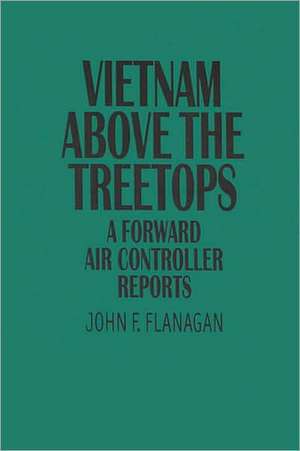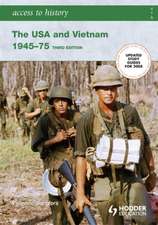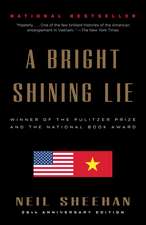Vietnam Above the Treetops: A Forward Air Controller Reports
Autor John F. Flanaganen Limba Engleză Paperback – 9 feb 1992 – vârsta până la 17 ani
| Toate formatele și edițiile | Preț | Express |
|---|---|---|
| Paperback (1) | 180.95 lei 6-8 săpt. | |
| Bloomsbury Publishing – 9 feb 1992 | 180.95 lei 6-8 săpt. | |
| Hardback (1) | 441.29 lei 6-8 săpt. | |
| Bloomsbury Publishing – 9 feb 1992 | 441.29 lei 6-8 săpt. |
Preț: 180.95 lei
Preț vechi: 233.71 lei
-23% Nou
Puncte Express: 271
Preț estimativ în valută:
34.63€ • 37.60$ • 29.09£
34.63€ • 37.60$ • 29.09£
Carte tipărită la comandă
Livrare economică 22 aprilie-06 mai
Preluare comenzi: 021 569.72.76
Specificații
ISBN-13: 9780313360633
ISBN-10: 0313360634
Pagini: 336
Dimensiuni: 156 x 235 x 18 mm
Greutate: 0.45 kg
Editura: Bloomsbury Publishing
Colecția Praeger
Locul publicării:New York, United States
ISBN-10: 0313360634
Pagini: 336
Dimensiuni: 156 x 235 x 18 mm
Greutate: 0.45 kg
Editura: Bloomsbury Publishing
Colecția Praeger
Locul publicării:New York, United States
Notă biografică
JOHN F. FLANAGAN was among the first graduates of the United States Air Force Academy and earned an MBA from Boston College. After Vietnam, he worked as an international business executive, a presidential exchange executive, and a college professor and business consultant in New York. He attained the rank of Brigadier General in the Air Force Reserve.
Cuprins
IntroductionSetting the ValuesPrelude to Combat: Creating a WarriorOrientation and Transition to CombatDefending Highway 1: Phu Cat with the KoreansClearing the Valley: Koreans Launch Tiger VFACing with the Screaming Eagles at Tuy HoaProject Delta at Chu Lai: Flying the F-4The Central Highlands: Battling Monsoons and VCProject Delta in III Corps: Song Be and Tay NinhSearch for F-4 Pilot, Return to War Zone CBattle at Khe Sanh: FAC Shot DownKhe Sanh AgainWinding Down: Re-entry into the WorldThe Conflict Continues, the Values EndureEpilogueGlossaryBibliographyIndex
Recenzii
An Air Force officer's vigorous account of the Vietnam War.Flanagan's memoir is not like Robert Mason's in Chickenhawk (1983), where the naive young officer is transformed into an embittered veteran questioning all wars. Flanagan became a general. His job in Vietnam was to fly close in with small aircraft, to report and coordinate what he saw; sometimes, too, he had to don infantry gear and head into the jungle. Many of his blow-by-blow accounts of battles are drawn from notes.This is the perspective of a veteran who feels we failed because of a lack of resolve, that the news media distorted events or couldn't understand them, that the antiwar movement meant well but was wrong.Splendid tales of combat. Flanagan, a U.S. Air Force pilot in the Vietnam War, describes his experiences as a forward air controller (FAC) working with our allies and with U.S. Army DELTA teams. (A forward air controller flies in a small prop plane and acts as a link between ground troops and larger attack aircraft by providing navigational aid and marking targets.) Flanagan's introduction, describing his deep psychological need to share his war experiences, leads the reader to expect a harrowing study of what war does to people (in the vein of James C. Donahue's No Greater Love: A Day with the Mobile Guerrilla Forces in Vietnam, Daring Bks., 1988; or Matthew Brennan's Brennan's War, Pocket Bks., 1989). Instead, one finds the same set-piece descriptions of ground combat that are standard in Vietnam War books. The author's large ego might make readers think Ehat Flanagan was the best FAC ever to serve in the war. Little depth here, just the diary of a pilot on an unglamorous but important mission. Recommended only for libraries with large Vietnam War collections.
John Flanagan is a skilled narrator. Throughout the book, the reader feels a sense of place, of being there. Vivid descriptions of people, places and situations abound. The author's idea of the warrior spirit, the meaning and futility of war is presented from his unique perspective. I purely enjoyed reading this book. Its insights into the times and personal side of war are valuable and thought provoking. The mission narratives are riveting. I found his discussion of the impact of his Air Force Academy education to be very illuminating and perhaps fresh ground. As Flanagan points out, It had produced its first echelon of combat veterans. This vivid story is testimony to that.
If you served in Vietnam, you'll recognize that John is giving it to you straight. If you didn't serve there, but are looking to learn more about why we lost the war, Vietnam Above the Treetops is full of stories about what worked and what didn't.
The author of this outstanding military memoir describes his experiences in Vietnam as a forward air-controller in 1966, piloting slow-moving, low-flying spotter planes, orchestrating spectacular air strikes (saturation ordinance) and shepherding the long-range reconnaissance teams of Project Delta, an autonomous Special Forces outfit staffed by Americans and Vietnamese. A strong writer with an eye for telling detail, Flanagan vividly conveys what it was like flying hazardous missions in monsoon weather, bending rules and regulations for the sake of the task at hand, enjoying the camaraderie of fellow warriors and waging war despite critical shortages and malfunctions.The most dramatic section of the book tells a two-part story of the loss of a Project Delta team in an ambush and the night 16 years later when a voice on the phone said My name is Eleanor Bott Gregory. Do you know what happened to my brother?
Something made Flanagan mad in Vietnam, and it just won't go away. What got to him was an enemy--not the Viet Cong of North Vietnamese Army but an immorality, an institutional rot that every American serviceman and woman had to deal with.
Adds much to one's understanding of the air war in Vietnam, but it also describes the close working relationship between members of separate services when the job called for them to work together in spite of interservice rivalry. This is a book that belongs on the bookshelf of anyone with an interest in Vietnam.
Readers should persevere, and those who do will be rewarded. They will find a well told story which ably conveys precisely what the complex, difficult, important, and dangerous job of the forward air controller was during the Vietnam War.
A thoughtful even intellectual account about FAC flying above the tree tops (at tree top level often).
Flanagan recounts his time in the US Air Force flying single-engine spotter planes linking fighter-bomber pilots and ground combat forces during the Vietnam War in 1966. He draws on letters, maps, pocket diaries, interviews with comrades, and of course his own memory to describe how junior officers and non-commissioned officers, like him,carried the brunt of war trapped between the bravery of the warriors beneath them and the convoluted politico-military command structure above them.
John Flanagan is a skilled narrator. Throughout the book, the reader feels a sense of place, of being there. Vivid descriptions of people, places and situations abound. The author's idea of the warrior spirit, the meaning and futility of war is presented from his unique perspective. I purely enjoyed reading this book. Its insights into the times and personal side of war are valuable and thought provoking. The mission narratives are riveting. I found his discussion of the impact of his Air Force Academy education to be very illuminating and perhaps fresh ground. As Flanagan points out, It had produced its first echelon of combat veterans. This vivid story is testimony to that.
If you served in Vietnam, you'll recognize that John is giving it to you straight. If you didn't serve there, but are looking to learn more about why we lost the war, Vietnam Above the Treetops is full of stories about what worked and what didn't.
The author of this outstanding military memoir describes his experiences in Vietnam as a forward air-controller in 1966, piloting slow-moving, low-flying spotter planes, orchestrating spectacular air strikes (saturation ordinance) and shepherding the long-range reconnaissance teams of Project Delta, an autonomous Special Forces outfit staffed by Americans and Vietnamese. A strong writer with an eye for telling detail, Flanagan vividly conveys what it was like flying hazardous missions in monsoon weather, bending rules and regulations for the sake of the task at hand, enjoying the camaraderie of fellow warriors and waging war despite critical shortages and malfunctions.The most dramatic section of the book tells a two-part story of the loss of a Project Delta team in an ambush and the night 16 years later when a voice on the phone said My name is Eleanor Bott Gregory. Do you know what happened to my brother?
Something made Flanagan mad in Vietnam, and it just won't go away. What got to him was an enemy--not the Viet Cong of North Vietnamese Army but an immorality, an institutional rot that every American serviceman and woman had to deal with.
Adds much to one's understanding of the air war in Vietnam, but it also describes the close working relationship between members of separate services when the job called for them to work together in spite of interservice rivalry. This is a book that belongs on the bookshelf of anyone with an interest in Vietnam.
Readers should persevere, and those who do will be rewarded. They will find a well told story which ably conveys precisely what the complex, difficult, important, and dangerous job of the forward air controller was during the Vietnam War.
A thoughtful even intellectual account about FAC flying above the tree tops (at tree top level often).
Flanagan recounts his time in the US Air Force flying single-engine spotter planes linking fighter-bomber pilots and ground combat forces during the Vietnam War in 1966. He draws on letters, maps, pocket diaries, interviews with comrades, and of course his own memory to describe how junior officers and non-commissioned officers, like him,carried the brunt of war trapped between the bravery of the warriors beneath them and the convoluted politico-military command structure above them.





















